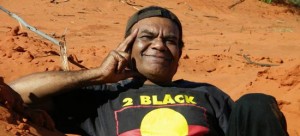
Lionel was born in 1958 in Cherbourg, which he describes as a punishment reservation for Aboriginal people who failed to toe the government line. It’s a place that has remained in his imagination. “My poetry shows the atrocities I grew up with in Cherbourg and all the restrictions that we had,” he said.
People from all over Queensland were taken there, and Lionel grew up listening to many languages. “My poetry also shows all the different dialects I grew up with and all the silent kinds of languages that were squashed by Christianity and the Mission.”
His artistic career didn’t really begin until he left Cherbourg for Brisbane. “In Cherbourg I wasn’t really doing art.
In Cherbourg art was everyday, around my fire, and poetry was an oral tradition, and writing was bits and pieces of writing from mothers and fathers to sons and daughters in jail, and that was how I began to learn how to write,” said Lionel.
When he moved to Brisbane in his teens, Lionel became involved with the Aboriginal Rights struggle being led by people such as Denis Walker and Gary Foley.
“In my first kind of writings, I started to write a lot of political writings, because I was involved with the Black Resource Centre, which was founded by Cheryl Buchanan back in 1975. I was doing a lot of work on Black Resource Centre Collective, which was like a newspaper they were putting out through the Australian Union of Students, and I found myself writing and collating things for that,” said Lionel. His writing skills also developed as a result of being one of three people up on trumped-up charges of conspiracy against the state by the corrupt right-wing Bjelke-Petersen government and its police force – charges of which he was acquitted. “Getting off those charges made me write a lot of political stuff. I wrote a book, The Making and Breaking of a Black Militant, about that.”
His poetry also came out of the protest movement. “I was one of those guys who would go out the front, holding a megaphone and yelling ‘What do you want?’ and ‘What have you got?’ and that kind of thing. But coming off that, basically, and having children, I realised I had to make some sense out of my yelling in demonstrations and that, and I found that poetry was a good form. So I looked up Kath Walker, who had just changed her name to Oodgeroo at that point, and I looked up Jack Davis and Kevin Gilbert and a few other people in the struggle movement. I spent a lot of time with Kevin Gilbert, who influenced me a lot.”
“I thought to myself that poetry would be the best way to try and conquer English – and introduce Aboriginal language, you might say. Basically I found I was using broken English and bits and pieces of languages from different tribes like Wakka Wakka, Jagera and Bandjalung,”
This taking, not just from English but a number of Aboriginal languages, is one of the reasons why Lionel’s poetry has developed what he refers to as a mosaic form, a style that has been applauded by poets and critics around the world. Right now though, the purpose of his poetry is changing, and so is his style.
“I’m getting away from mosaic style, trying to break it down into a more simplistic form, more rhythm, make it more understandable. Lyrical poems or character poems, not so much mosaic poems, that’s in the line of what I want to do now. It’s like a rapper kind of thing, but in written form to help younger people understand the political implications and the cultural implications of the writing field itself.”
Society has changed, too, since he started protesting in the 70s. “I think that what’s changed is that people have to take notice of our intelligence, of what we’ve got in our community, that we know about the white-man law and we know about the English and we know how to interpret it the way we like to interpret it, not how they want us to interpret it,” he says.
“It gives us the opportunity to correct all the colonial writers from a long time ago that people take in their hearts and minds as authentic. We can come back and counteract that kind of writing with our own writing. I think that’s been a big change in our community, for the wider community to see that we have an opportunity now to get that done. And the change is that we have Black Ink and Magabala, and we have other Aboriginal publishing companies yet to be developed and come up. For example, with all my writings now I like to give our translators in the bigger speaking languages, like Pitjantjatjara the chance to translate a lot of our kind of writing instead of whitefella stuff, ” Lionel said.
While there has been progress, recognition for Aboriginal people remains inadequate, said Lionel. “I don’t see no national library for Aboriginal people, I don’t see no holiday for Vincent Lingiari or Albert Namatjira, no national holiday for the special people in our community that’s celebrated throughout Australia.”
He believes it’s a strong time for Aboriginal writing that needs to be recognised. “We have 5000 Aboriginal authors in this country and that’s something of great importance. We should be having bestsellers every year in the Australian mainstream, no matter if it’s poetry, novels fiction, whatever. One day we’ll have an Aboriginal Writers’ Day, when there’ll be a vacation or maybe a march where all the other authors in Australia will back us up,” Lionel said.
Comments are closed.